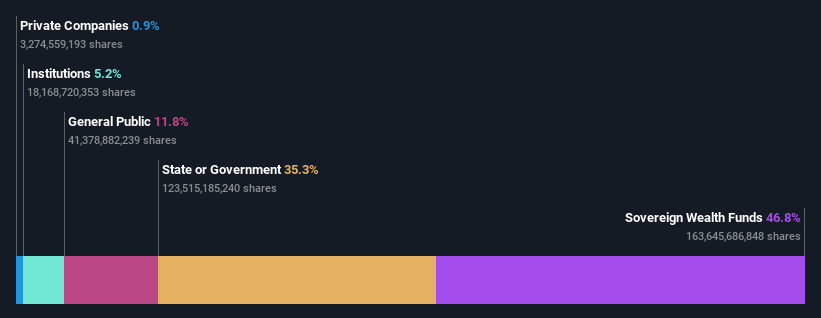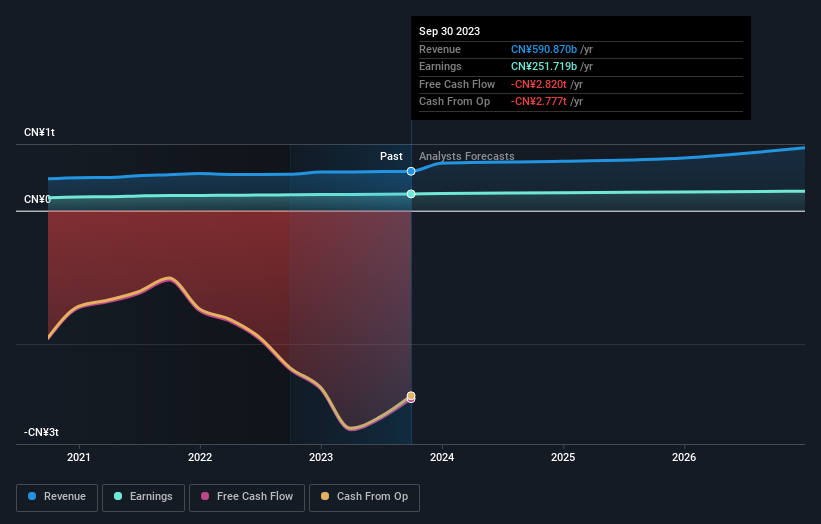Agricultural Bank of China Limited's (HKG:1288) top owners are sovereign wealth funds with 47% stake, while 35% is held by state or government

Key Insights
- The considerable ownership by sovereign wealth funds in Agricultural Bank of China indicates that they collectively have a greater say in management and business strategy
- The top 2 shareholders own 75% of the company
- Ownership research along with analyst forecasts data help provide a good understanding of opportunities in a stock
A look at the shareholders of Agricultural Bank of China Limited (HKG:1288) can tell us which group is most powerful. We can see that sovereign wealth funds own the lion's share in the company with 47% ownership. That is, the group stands to benefit the most if the stock rises (or lose the most if there is a downturn).
And state or government on the other hand have a 35% ownership in the company.
Let's delve deeper into each type of owner of Agricultural Bank of China, beginning with the chart below.
Check out our latest analysis for Agricultural Bank of China

What Does The Institutional Ownership Tell Us About Agricultural Bank of China?
Institutional investors commonly compare their own returns to the returns of a commonly followed index. So they generally do consider buying larger companies that are included in the relevant benchmark index.
As you can see, institutional investors have a fair amount of stake in Agricultural Bank of China. This suggests some credibility amongst professional investors. But we can't rely on that fact alone since institutions make bad investments sometimes, just like everyone does. If multiple institutions change their view on a stock at the same time, you could see the share price drop fast. It's therefore worth looking at Agricultural Bank of China's earnings history below. Of course, the future is what really matters.

Hedge funds don't have many shares in Agricultural Bank of China. Central Huijin Investment Ltd. is currently the company's largest shareholder with 40% of shares outstanding. With 35% and 6.7% of the shares outstanding respectively, Ministry of Finance of the People's Republic of China and National Council for Social Security Fund are the second and third largest shareholders.
A more detailed study of the shareholder registry showed us that 2 of the top shareholders have a considerable amount of ownership in the company, via their 75% stake.
While studying institutional ownership for a company can add value to your research, it is also a good practice to research analyst recommendations to get a deeper understand of a stock's expected performance. Quite a few analysts cover the stock, so you could look into forecast growth quite easily.
Insider Ownership Of Agricultural Bank of China
While the precise definition of an insider can be subjective, almost everyone considers board members to be insiders. Management ultimately answers to the board. However, it is not uncommon for managers to be executive board members, especially if they are a founder or the CEO.
Most consider insider ownership a positive because it can indicate the board is well aligned with other shareholders. However, on some occasions too much power is concentrated within this group.
Our data cannot confirm that board members are holding shares personally. It is unusual not to have at least some personal holdings by board members, so our data might be flawed. A good next step would be to take a look at this free summary of insider buying and selling.
General Public Ownership
The general public, who are usually individual investors, hold a 12% stake in Agricultural Bank of China. While this size of ownership may not be enough to sway a policy decision in their favour, they can still make a collective impact on company policies.
Next Steps:
I find it very interesting to look at who exactly owns a company. But to truly gain insight, we need to consider other information, too.
I like to dive deeper into how a company has performed in the past. You can find historic revenue and earnings in this detailed graph.
If you would prefer discover what analysts are predicting in terms of future growth, do not miss this free report on analyst forecasts.
NB: Figures in this article are calculated using data from the last twelve months, which refer to the 12-month period ending on the last date of the month the financial statement is dated. This may not be consistent with full year annual report figures.
New: Manage All Your Stock Portfolios in One Place
We've created the ultimate portfolio companion for stock investors, and it's free.
• Connect an unlimited number of Portfolios and see your total in one currency
• Be alerted to new Warning Signs or Risks via email or mobile
• Track the Fair Value of your stocks
Have feedback on this article? Concerned about the content? Get in touch with us directly. Alternatively, email editorial-team (at) simplywallst.com.
This article by Simply Wall St is general in nature. We provide commentary based on historical data and analyst forecasts only using an unbiased methodology and our articles are not intended to be financial advice. It does not constitute a recommendation to buy or sell any stock, and does not take account of your objectives, or your financial situation. We aim to bring you long-term focused analysis driven by fundamental data. Note that our analysis may not factor in the latest price-sensitive company announcements or qualitative material. Simply Wall St has no position in any stocks mentioned.
About SEHK:1288
Flawless balance sheet established dividend payer.
Market Insights
Community Narratives




